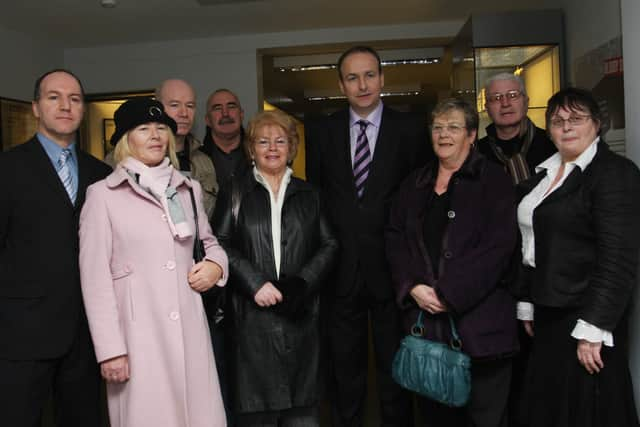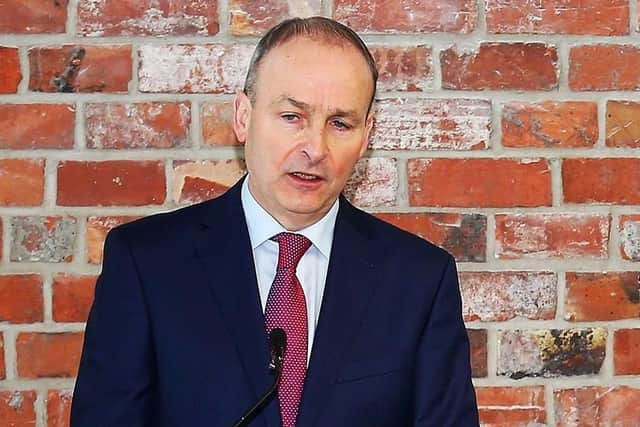Bloody Sunday 50th Anniversary: A Reflection by An Taoiseach Micheál Martin
and live on Freeview channel 276
The events of Bloody Sunday fifty years ago represent one of the darkest days for this island.
On 30 January 1972, thousands of men and women left their homes in Derry to attend a peaceful civil rights march. Thirteen of them did not return home. One of the many injured in the mass shooting that took place, John Johnston, died only a few months later of his injuries. The poet Seamus Deane wrote of that day: ‘The roads died, the clocks went out’.
Advertisement
Hide AdAdvertisement
Hide AdFor the families of those who died, those injured, and the wider community in Derry, the pain and trauma of that day and its aftermath were further reinforced by the subsequent Widgery inquiry and its findings. But the determination of the families and campaigners in tirelessly working to overturn this report, pursuing the truth with vigour and passion, showed their strength and fortitude and their commitment to truth and justice.


They and their loved ones were finally vindicated with the publication of the Saville report and the apology by the British Prime Minister, placing on the historical record the innocence of the victims and the fact that their killings were unjustified and unjustifiable. Successive Irish Governments played their role also in this long road to truth.
In remembering the victims of Bloody Sunday and the events of that day, we also remember the pain and loss suffered by so many other ordinary people during the Troubles, victims of violence, conflict and division. Thirty years of violence and atrocity that were not justified and can never be justified.
The inventory of murders and attacks over so many years, is too long to recount here today. It is heartbreaking to note that the annual reading of the names of all those lost to the Troubles in the Unitarian Church in Dublin on Good Friday takes three hours to read aloud.
Advertisement
Hide AdAdvertisement
Hide AdWe know that the pain and loss inflicted can never be reversed. There may be some physical healing but the trauma and scarring remains, and reverberates down the generations. This illustrates the profound importance of access to justice and truth for all victims of the Troubles and their families. It is why the Irish Government has been consistently opposed to unilateral action in this area. It is vital that we have in place a comprehensive and agreed framework to deal with the painful legacy of our past. Only a collective approach, that meets the needs of families and upholds our shared human rights obligations, can represent a path forward. All families deserve access to information and a process of justice for their loved one, regardless of the perpetrator.


The recently deceased Desmond Tutu said ‘hope is being able to see that there is light despite all the darkness’. Out of the dark years of the Troubles we have come to a new, shared idea of relationships on this island and between these islands.
The Good Friday Agreement is at the heart of our new understandings, it has opened up fresh possibilities and perspectives and commits us to partnership, equality and mutual respect as the basis for the three sets of relationships on these islands.
We have made hugely significant strides forward since 1998, with a whole generation in Northern Ireland growing up and coming of age, in peace.
Advertisement
Hide AdAdvertisement
Hide AdBut there is still much that has to be done, if we are to achieve the goal of a fully reconciled future.
There is a particular responsibility for myself and other political leaders to ensure the suffering so many have endured will not be repeated for future generations. It is incumbent on us all to work through the Good Friday institutions to pursue the full potential of the Agreement to deliver prosperity, progress and a fully healed society.
There could be no better way to remember and honour Patrick Doherty, Gerald Donaghey, Jackie Duddy, Hugh Gilmour, Michael Kelly, Michael McDaid, Kevin McElhinney, Bernard McGuigan, Gerald McKinney, William McKinney, William Nash, John Johnston, James Wray and John Young.
Ar dheis Dé go raibh a n-anamacha